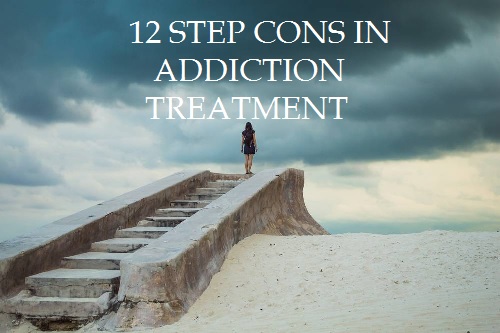The 12-steps recovery program was at one time the cornerstone in the treatment of drug and alcohol addiction. Started in the 1930s, it was the first popularized treatment methodology to acknowledge addiction as something other than a choice.
Today, the 12-steps Alcoholics Anonymous (AA) and Narcotics Anonymous (NA) are organizations dedicated to helping people worldwide achieve sobriety through a series of graduated steps and regular meetings. New up to date research looks at the efficacy of 12-steps programs like AA and NA, but the several studies done indicate that this outdated program does not seem to support much to benefit from such a program. In most cases, a 12-steps program is proven to not be as effective as other therapies, when used alone.
A 12-steps program like AA or NA provides a framework of steps in acknowledging the addiction, accepting the consequences of the addiction, ways to mend at least some of the damage done while using, and encourages the building of a network of support through a service-oriented 12th step. For the large number of people AA and NA provide support to, it’s a self-sufficient organization supported by donation. Someone wishing to seek help through a 12-step program can do so at no cost. And with cost of treatment being a primary barrier for most people, 12-step programs can offer a life-line of support but little in the way of effective solution to Addictions.
Evidence brought about by studies supports the in-effectiveness of AA and NA. One of those studies, examined the effectiveness of three different treatment types in reducing overall drinking and drug use, including cognitive behavioral therapy (CBT), motivational therapy and simple talk therapy and empowerment. While all three treatment types showed promise, CBT therapy resulted in the most significant long-term impact.
While the traditional 12-steps program had proven effective for many in past years, there are some drawbacks to this form of treatment today with the advancement of addictions through mental health. The 12-step model emphasizes the powerlessness of the individual in battling addiction, and studies have found this approach to be less effective.
Research indicates men and women begin drinking for different reasons. While men tend to drink to feel more powerful and to decrease inhibition, women are more likely to drink from a place of numbing or pain reduction. They do not report feeling more powerful while drinking. As a result, women tend to see improved outcomes with cognitive behavioral therapy as well as programs like the trauma recovery empowerment model (TREM), which seek to empower women toward skill-building and coping with past sexual and physical trauma.
Another con of the 12-steps program, especially for humanists or atheists, is the program’s fundamental adherence in the belief of a higher power. While this higher power is sometimes interpreted as the program itself, this reliance on an outside power to guide the process may not be a comfortable notion for most.
Other drawbacks of the 12-steps program involve the lack of emphasis on physical recovery. Addiction comes with adverse health effects and withdrawal symptoms that are not addressed by the 12-steps model.
Some are also uncomfortable with the very public nature of 12-steps programs in asking participants to acknowledge their addiction in a group setting. For someone with a co-occurring mental disorder, the experience of talking about their drug or alcohol use in a group setting can increase symptoms of the disorder.
Cons
- Not an empowerment model, so less effective for most seeking treatment
- Reliance on a higher power, individuals are powerless to affect change without this higher power
- Lacks emphasis on physical aspects of recovery, including withdrawal or detox period
- Social aspects of program may increase symptoms of co-occurring mental disorders
- Lack any and all resolve by way of mental health work.
- Is a faith based program as compared to an Evidence based program
Every year brings forth additional awareness of the complexity of addiction and improvements in recovery programs to increase long-term success rates. The Canadian Addiction Recovery Network program or CARNE has proven to be a more comprehensive approach to treating drug and alcohol addiction.


Leave a Comment
You must be logged in to post a comment.